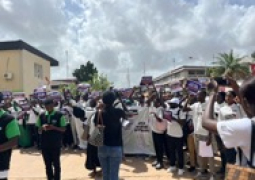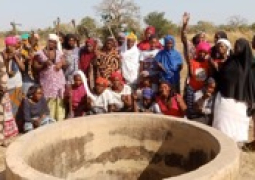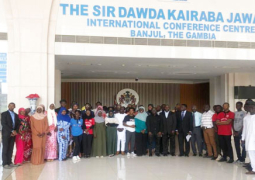
The twelve months project is aimed at enhancing community resilience to climate change by improving soil health, water retention, biodiversity and carbon sequestration through the establishment of agroforestry systems and promote sustainable income generation opportunities for farmers through the diversification of agricultural products, including value-added products derived from agroforestry components, among others.
The main objective of the project is to establish agroforestry demonstration plots in selected communities, showcasing the benefits and techniques of integrating trees with agricultural crops and provide training and capacity-building initiatives to farmers and community members on agroforestry techniques, sustainable land management practices, and climate change adaptation strategies.
The project is set to commence in October 2023 and anticipated to end in September 2024.
The scheme will be implemented in five communities within the North Bank Region of The Gambia. It will follow a participatory and community-centered approach, engaging local farmers, community leaders and relevant stakeholders throughout the project lifecycle.
The project is designed to promote environmental resilience, sustainable agriculture, and community development through agroforestry practices.
The consultation meetings are designed to amass and consolidate first-hand information from the communities and engage the baneberries on the best implementation strategy.
Samba Faye, project director and Executive Director of Plantation Nurseries said his intention is to combat climate change in all regions within The Gambia.
“This project is not only looking at tree planting exercises but also has a component that deals with educating farmers on how to maintain and combat climate change resilience,” he said.
Mr Faye said projects come and phase out, noting that the best way to achieve a goal is to equip farmers with the required knowledge and skills that will help them to stand against climate change.
“North Bank is the most vulnerable region in The Gambia when it comes to climate change. Our aim is to transform the whole region into a climate resilience community and at the same time serve as an example to other regions within The Gambia and beyond,” he said.
Omar Mbye, project coordinator said the project has two components (to combat climate change through the planting of more trees and to help farmers venture into animal husbandry.)
“Combating climate change is very important but we also want to increase the level of earnings of farmers by introducing wildlife farming where farmers will be provided with animals to rear,” he said.
He urged communities to take ownership of the project as it belongs to them. “We would have come up with the modalities of how we want to implement the project but we decided to visit you and engage you so that you can take ownership of the project,” he told them.
Fatou Jeng, community engagement officer of the CERA Project said the project has a component that deals with women participation.
“Women are the backbone of successful projects and are mostly affected when it comes to climate change. It reduces their level of earnings,” she said.
Madam Jagne said climate change is real and will continue to cause more harm if the necessary steps are not taken.
“I want to see women take ownership of the project which will help to improve our gardens, farmlands, among others,” she said.
Read Other Articles In National News

Global Platform Gambia calls for greater protection of environment
Sep 27, 2024, 11:07 AM




